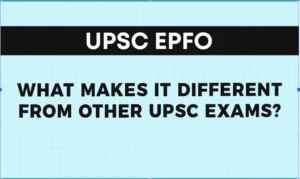What Makes UPSC EPFO Different from Other UPSC Exams?

Hey there, UPSC aspirants! Have you ever felt that while everyone is talking about Civil Services, other golden opportunities fly under the radar? Introducing the UPSC EPFO exam!
Trust me it is not another government exam, but it’s your chance to become an Enforcement Officer/Accounts Officer in the Employees’ Provident Fund Organisation. So let’s explore why this exam is so unique and an opportunity to work hard for.
The UPSC EPFO: Not Your Regular UPSC Exam
Before jumping on to the UPSC exam, first things first: this exam is like that family member who chose to be a rock star rather than coming into the family business. The UPSC EPFO has a unique personality of its own!
The most unique aspect of the UPSC EPFO examination is that it is unlike any other UPSC examination as it is a streamlined selection process.
Core Structural Difference
UPSC EPFO Structure
The UPSC EPFO follows a straightforward two-phase selection process:
Phase 1: MCQs.
- Objective examination
- Assesses candidate’s knowledge across prescribed subjects.
- It serves as the main screening mechanism.
Phase 2: Interview
- Personality assessment and knowledge verification.
- The last stage of the selection process
- Interaction with the selection board
Other UPSC Exams Structure
Most other UPSC examinations, like the Civil Services Examination (CSE), follow a more elaborate structure:
Preliminary Examination
- First level screening
- Objective type questions
- Qualifying in nature
Main Examination
- Detailed written examination
- Multiple papers
- It tests in-depth knowledge and writing skills.
Interview/Personality Test
- Final stage
- Full personality assessment
- Tests suitability for service
Impact of this Structural Difference
- Preparation Strategy
- MCQs of UPSC EPFO need focused preparation along with interviews.
- Additional preparation is required for other UPSC exams for written papers.
- Time Investment
- The two-phase structure of EPFO lends more to concentrated preparation.
- The preparation for traditional UPSC exams involves preparation across several examination formats.
- Assessment Format
- The objective knowledge and personality assessment has been the focus of EPFO.
- To supplement, other exams include additional evaluation of written expression and analytical ability.
Significance of This Distinction
This streamlined structure of UPSC EPFO makes it:
- More focused in its approach
- A different methodology of evaluation.
- A unique selection process
Note: This is a very important structural difference, but let me say that candidates must see to it that they check the latest UPSC EPFO Notification for details on examination patterns and other requirements, which can, of course, be changed.
Syllabus Scope and Focus
UPSC EPFO Syllabus:
- Specialized in labor laws and industrial relations.
- It is focused on accounting principles and frameworks of social security.
- Low general studies component
- Computer applications and quantitative aptitude in particular.
Other UPSC Exams:
- A wide range of knowledge requirement
- General studies coverage is very extensive.
- Multiple optional subjects
- It involves concentrating on current affairs and relations of international affairs.
Preparation Timeline
UPSC EPFO Preparation:
- It takes a typical 4-6 months of focused preparation.
- Specialized study in several domains
- More practical, more application-based preparation.
- Very limited need for current affairs, only in the context of labor law.
Other UPSC Exams:
- It is usually 1-2 years of preparation.
- Coverage of several subjects.
- In-depth theoretical knowledge is required.
- Current affairs and dynamic content with a heavy focus on facts
Job Profile
UPSC EPFO Role:
- Enforcement Officer/Accounts Officer Specific role
- EPFO operations job description is clear
- Social security and labor laws specialized domain
- Direct Impact on Workforce Welfare
Other UPSC Exams:
- Roles varied according to service allocation.
- Broader administrative responsibilities.
- There are several departments to choose from
- Varied range of public service areas
Recruitment Numbers
UPSC EPFO Vacancies:
- 400+ positions per recruitment cycle (usually)
- Consistent vacancy numbers
- Specific post allocation
- Direct recruitment to EPFO
Other UPSC Exams:
- A varying number of vacancies
- Multiple service allocations
- Departments and ministries
- Complex service allocation process
Eligibility Criteria
UPSC EPFO Requirements:
- Any Bachelor’s degree.
- Age limit: Relaxation as per rules: 30 years
- No subject background required
- Focus on practical knowledge
Other UPSC Exams:
- Different education requirements
- It has different age limits (e.g. 32 years for Civil Service).
- Some exams require specific educational backgrounds.
- Focus on the whole knowledge
Career Progression
UPSC EPFO Career Path:
- Structured growth within EPFO
- Specialization in labor and social security.
- Clear promotional hierarchy
- Focused domain expertise
Other UPSC Exams:
- Multiple career paths
- Inter-departmental movements
- Varied administrative roles
- Broader career scope
Preparation Resources
UPSC EPFO Resources:
- Limited and focused study materials.
- Labor laws and accounting-specific books
- Practice sets around relevant topics
- Current affairs related to the industry
Other UPSC Exams:
- Extensive study materials
- Each subject has multiple sources
- Comprehensive current affairs coverage
- Resources and various coaching institutes
The Final Verdict
The UPSC EPFO stands out primarily because of:
- Specialized job profile
- Shorter examination process
- The knowledge required is domain-specific.
- Clear career path
This makes it a unique opportunity for candidates who prefer:
- Administration over specialized roles
- Shorter preparation time
- General awareness related to technical knowledge
- Domain of labor welfare and social security
The difference between these two is significant for UPSC aspirants to make their own choices on their UPSC journey. The EPFO UPSC isn’t a lesser exam, it is just different, and it has its advantages and disadvantages differently.
